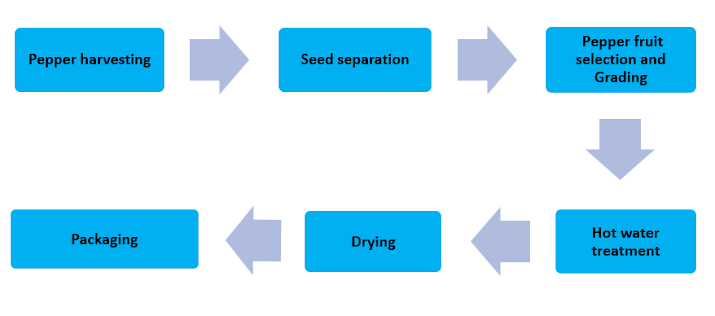🌿 Black Pepper Production / කළු ගම්මිරිස් නිෂ්පාදනය
🌿 Black Pepper Production / කළු ගම්මිරිස් නිෂ්පාදනය
👉 Black pepper (Piper nigrum) occupies a prominent place among spices around the world. Its distinctive flavor and aroma add a unique richness to dishes and make it an essential ingredient in culinary traditions around the world. From South Asian curries to European sauces, pepper is an essential spice. This article attempts to provide a proper understanding of the black pepper production process.
🌱 Importance of Black Pepper
Black pepper is not just a flavoring agent; it has strong antioxidant and many medicinal properties. In both Ayurveda and modern medicine, pepper is valued for aiding digestion, improving circulation, and boosting immunity.
In addition to its health benefits, pepper cultivation is an economically valuable crop that brings in significant income. Countries such as Vietnam, India and Sri Lanka are major contributors to the global pepper supply. Vietnam in particular is the world's largest pepper producer and exporter, demonstrating its agricultural and commercial importance.
🧺 Black Pepper Production Process
Producing high-quality black pepper requires careful attention to each step of the production process. Here are the key stages:
✅ 1. Harvesting at the right maturity stage
To ensure high quality, pepper berries should be harvested at the right stage, when they turn red but before they are fully ripe. Picking too early will result in a poor flavor, while harvesting too late can reduce the pepper's aroma and shelf life. This stage is very important, especially when processing half-ripe green berries to produce black pepper.
✅ 2. Pepper Fruit/Seed Separation
This is the first step in the processing of the crop and the seeds are separated by placing the harvested peppers in an open container for twelve to 24 hours and piling them up.
The seed separation is done in two main ways.
👉 Hand seeding
👉 Sorting by fruit sorting machines (electric/power-operated)
Mechanized seeding saves time while manual seeding requires more labor
✅ 3. Seed Selection and Grading
The harvest is sorted and graded based on the size, weight and maturity of the harvested pepper. Tools such as green berry sorters or mesh sieves of various sizes are used to:
★ Remove immature or underdeveloped pepper seeds
★ Remove hollow or pest-damaged pepper seeds
★ Retain fully developed, firm and mature seeds
★ Proper grading improves the appearance, taste and market value of the final product.
👉 Special machines are also used for this purpose. (Green berry sorter / Green berry sifter ) These machines select ripe and unripe peppers using sensors related to the color of the pepper seeds.
✅ 4. Hot Water Treatment (Blanching)
This step plays an important role in:
★ Killing surface microorganisms
★ Shortening drying time
★ Improving peppercorn color and uniformity
The peppercorns are blanched briefly in hot water (80–90°C for 2–3 minutes) using stainless steel mesh containers or perforated baskets. This step contributes to the shiny black appearance of high-grade black peppercorns.
✅ 5. Drying Process
Drying reduces the moisture content of the peppercorns from 75% to 10–12%, making them shelf-stable and ready for packaging.
Two common methods of drying include:
🔹 Sun drying:
Traditional and cost-effective. Peppercorns are spread thinly on clean trays or mats and dried in the sun for 3–5 days, stirring regularly.
🔹 Artificial drying:
Modern, hygienic and fast. Equipment used:
Solar dryers
Cabinet dryers
Flat bed dryers
🌿 Value-Added Products from Black Pepper
Ground Black Pepper (Black Pepper Powder)
★ Finely ground from dried black peppercorns
★ Used in cooking, spice blends, and packaged foods
Black Pepper Essential Oil
★ Extracted through steam distillation
★ Used in aromatherapy, cosmetics, and pain relief oils
Black Pepper Oleoresin
★ A concentrated extract of piperine and volatile oils
★ Used in food flavoring, pharmaceuticals, and supplements
Flavored Black Pepper Blends
★ Blended with lemon, garlic, herbs, or smoked flavors
★ Sold as gourmet seasoning mixes
Black Pepper Herbal Tea Mixes
★ Combined with turmeric, ginger, or cinnamon
★ Marketed as a health-boosting beverage
Black Pepper Capsules / Piperine Supplements
★ Used to enhance nutrient absorption (e.g., with curcumin)
★ Found in wellness and fitness markets
Black Pepper Pickles / Fermented Pepper
★ Whole or semi-ripe black pepper preserved in brine or spices
★ Popular in artisanal food markets
Instant Soup Powders / Seasoning Mixes
★ Pepper added to dry soup and curry bases
★ Convenient product for fast meal preparation
Black Pepper Marinades and Sauces
★ Used in meat, seafood, or barbecue recipes
★ Often blended with vinegar, soy sauce, or garlic
Pepper-Based Health Drinks / Tonics
★ Included as a warming or digestion-aiding ingredient
★ Marketed in tradition
👉 onal medicine-based drinks
🌟 Conclusion
When every stage of black pepper production (from harvesting to proper drying) is carried out with care and precision, the result is high-quality black pepper with excellent flavor, color, and storage quality, with high market value.
📢 Join our Google Blog for more expert insights on spice cultivation, pepper processing, and modern agricultural technologies that can boost your productivity and income.



















No comments: